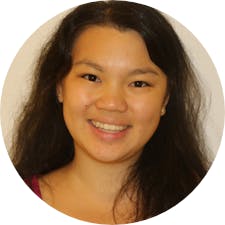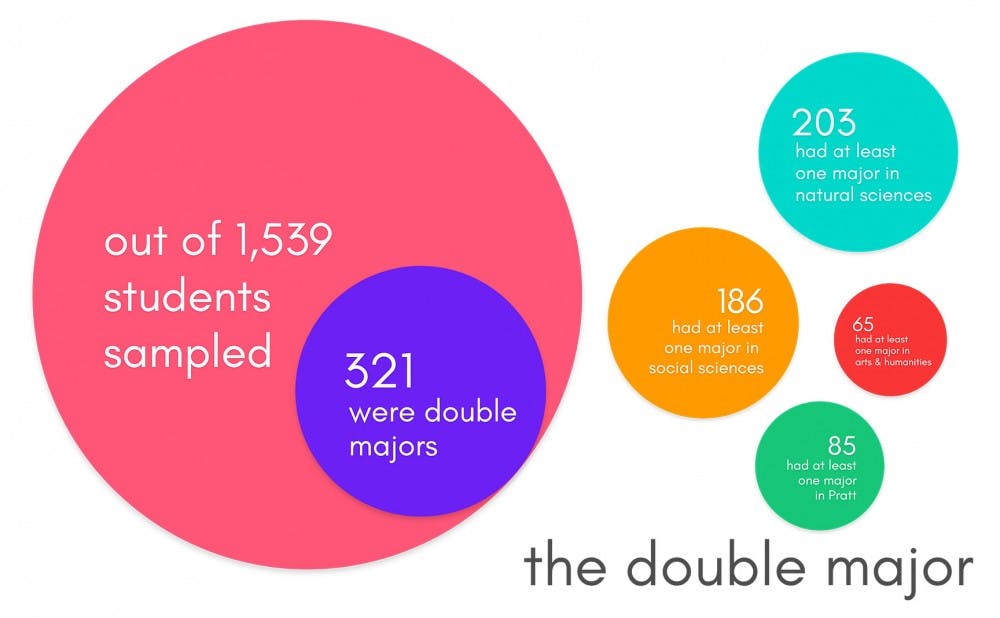"[Leonardo da Vinci] pretty quickly understood that a human would not be able to flap enough to create enough lift to overcome the human weight,” said Eli Weinreb, Pratt '18.
As the first-ever graduate of the medieval and renaissance studies department from the Pratt School of Engineering, he is perhaps the most qualified Duke graduate to make that statement. Weinreb was a mechanical engineering and medieval and renaissance studies double major, also receiving the aerospace engineering certificate.
In his senior year, he studied da Vinci's initial notes of how to create a flying machine—and then decided to build it, with the help of some fellow mechanical engineering students. This six-foot tall, flapping, flying machine—called an ornithopter—earned Weinreb graduation with distinction in medieval and renaissance studies and also served as his mechanical engineering senior project.
Interdisciplinary double majors
Students like Weinreb are not common on campus. According to data gathered by The Chronicle for the graduating class of 2018, only three students out of 1,539 in the dataset pursued a double major between Pratt and an arts and humanities department in the Trinity College of Arts & Sciences.
In contrast, 74 students pursued double majors between the social sciences and natural sciences, and 70 students pursued double majors between Pratt and the natural sciences, with 60 of them being engineering and computer science double majors. The visualization of double majors data by field can be found here, while a more detailed breakdown by department can be found here.
There were a total of 321 students who double majored, which is about 21 percent of the dataset. The largest proportion of double majors occur between natural sciences and social sciences, as well as between Pratt and natural sciences. The least common double majors occurred between Pratt and arts and humanities, as well as double majors within arts and humanities.
There were 15 majors where at least half of the students also double majored. Ten of these majors are classified in the arts and humanities, two are natural sciences and three are social sciences. Two-thirds of the most common majors where students double major are in the arts and humanities fields. Furthermore, 48 percent of computer science majors had a double major, which is 113 out of 235 students.
On the other hand, there were 14 majors with less than 25 percent of the students double majoring, including sociology, chemistry, evolutionary anthropology, neuroscience and public policy.
According to a report put out by Richard N. Pitt and Steven Tepper from Vanderbilt University, the two most common reasons college students pursue a double major are "to get preparation for work" and to have "two majors that together reflect who I am." The same report notes that nationwide, the most common double major is between two business majors.
Duke does not offer an undergraduate business major, but a majority of students study something that may have a clear professional path--computer science, engineering, public policy, economics and biology. Many also study subjects that are personally meaningful to them, including but certainly not limited to those pursuing Program II or an interdepartmental major.
At the same time, Duke has been pushing and promoting interdisciplinary engagement. Initiatives like Arts and STEM Week, Bass Connections, Data+ and Story+ are all aimed at fostering academic engagement between disciplines.
However, Weinreb noted that he has engineering friends who are frustrated because they have to take a social science or history course as part of their graduation requirements.
"I did a double major in that, so stop complaining,” he said in response to their grumblings.
Yet, before Curriculum 2000 required students to take courses in every area of knowledge, nearly half of Duke undergraduates never took either a math course, a foreign language course or a science course before graduating, according to William Chafe, dean of the faculty of arts and sciences and vice provost for undergraduate education at the time.
So who are the people willing to embrace interdisciplinary academic pathways, and what was their inspiration?
Separate but equal?
Sujal Manohar, photography editor for The Chronicle, is another student pursuing an interesting double major: neuroscience and visual arts. Coming in, she knew that she wanted to major or minor in visual arts and something STEM-related. After enjoying a neuroscience course her second semester and considering the other options—an interdepartmental major, Program II or a major and minor combination—she ultimately settled on the double major.
Alongside her coursework, she now does many activities at the intersection of the two fields: an art exhibit at the Wellness Center on stress and mental health, research on eye tracking and implicit judgement, an internship with a mental health startup. Academically, however, there is no overlap in coursework.
Senior Kendall Bell also is a natural sciences and humanities double major. He entered Duke knowing he liked chemistry, so he enrolled in organic chemistry his first semester.
Get The Chronicle straight to your inbox
Sign up for our weekly newsletter. Cancel at any time.
"If I survive this, and I still like chemistry, then I'm just going to keep doing this,” Bell thought at the time.
That first semester, he also took Intro to Latino/Latina Studies, taught by Antonio Viego, the director for undergraduate studies for the global cultural studies major. Bell ended up declaring a double major in chemistry and global cultural studies, along with a minor in African and African-American studies, under the rationale that he would be taking classes in those fields regardless.
"If they were classes I wanted to take, I might as well pick up the major. But if I was sacrificing classes I wanted to take to get the major, then what's the point of doing that?" he said.
Weinreb entered the Pratt School of Engineering studying mechanical engineering, but he had always been interested in his history classes. His first semester, he enrolled in Old Worlds, New Histories. By the beginning of his junior year, he knew he was going to pursue the medieval and renaissance studies minor. The decision to upgrade to a double major didn't come until his senior year, after he realized that he could finish the major requirements. He got the idea for the ornithopter machine that semester as well.
Aside from coursework, the double major also plays an interesting role in shaping one's academic identity. Manohar noted that doing the double major helps keep her from being seen as just another "neuroscience pre-med.” Bell added that there is often a tension between his "good major,” which is chemistry, and his "bad major,” global cultural studies. Bell said he commonly gets asked, "What's cultural studies?"
Looking forward
Given that sophomores must declare a major by second semester, pursuing two majors with little overlap requires even more planning in advance. Both Manohar and Bell cite AP credit as a factor that helped them fit in all the classes for their double majors. Bell also noted that luck played a role—classes he took first semester happened to count toward his future major.
As for post graduation plans, Weinreb is currently working as a lab manager and teaching assistant in the Pratt School of Engineering. Bell, who has been a teaching assistant for Math 111 and Math 112 since his sophomore year, plans to pursue a teaching career, presumably in high school and middle school teaching math or science. Manohar is on the premedical track, but has also considered design work in areas like neuroesthetics, user interface and user experience design and art therapy.
Methodology
- Data collection
- The data only includes members of the entering class of 2018 who were listed in the Freshman Directory. There were 1755 names in the Freshman directory. This dataset only includes majors for 1539 students. The remaining students either graduated early, have not graduated yet, or transferred.
- Majors information was collected from individual majors ceremonies on graduation day. The exception was for Medieval and Renaissance Studies, through which the information was obtained directly from the Director of Undergraduate Studies.
- Data analysis
- Trinity majors were grouped into "Arts & Humanities", "Social Sciences", and "Natural Sciences" based on the distinctions on the Trinity homepage, with the following two notes:
- The Psychology & Neuroscience department was listed under both Social Sciences and Natural Sciences. Therefore, we counted Psychology as a social science and Neuroscience as a natural science
- Philosophy was listed under Arts & Humanities and Social Science. We placed it under Arts & Humanities .
- Pratt majors were simply listed under "Engineering" and we had no more detailed information on the specific major
- There were four students who pursued a double major in Trinity and a single major in Pratt. (The data does not capture those who pursued a double major in Pratt and a single major in Trinity) All four were double majoring between engineering and computer science. Three had an additional major in economics, and the fourth had an additional major in math. These four people were not included in the data above.
- "Other" includes Program II and interdepartmental majors.
- Trinity majors were grouped into "Arts & Humanities", "Social Sciences", and "Natural Sciences" based on the distinctions on the Trinity homepage, with the following two notes:

Amy Fan is a Trinity senior. Her column, "fangirling," runs on alternate Thursdays.

